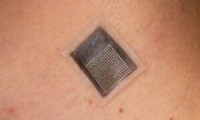-
New study reveals the best diets for a healthy heart
- Source: drugdu
- 480
- May 5, 2023
-
Magic mushrooms may induce lasting improvements in color-blind vision
- Source: drugdu
- 303
- May 5, 2023
-
Wearable ultrasound researchers report breakthrough in deep tissue monitoring
- Source: drugdu
- 580
- May 5, 2023
-
Algorithm generates 128-fold increase in antibodies
- Source: drugdu
- 389
- May 5, 2023
-
Bristol Myers Squibb and Tubulis partner in deal worth over $1bn
- Source: drugdu
- 472
- May 5, 2023
-
ChatGPT outshines physicians in quality and empathy for online patient queries
- Source: drugdu
- 451
- May 5, 2023
-
Mpox outbreak was wake-up call for smallpox preparation, vaccine maker Bavarian Nordic says
- Source: drugdu
- 308
- May 5, 2023
-
African psychedelic plant medicine inspires new drug candidates for treating addiction and depression
- Source: drugdu
- 318
- May 5, 2023
-
Pfizer Acquires COVID-Flu Test Developer Lucira Health for USD 36.4 Million
- Source: drugdu
- 308
- May 5, 2023
-
Study shows link between obesity and adverse postoperative outcomes
- Source: drugdu
- 343
- May 5, 2023
your submission has already been received.
OK
Subscribe
Please enter a valid Email address!
Submit
The most relevant industry news & insight will be sent to you every two weeks.

















